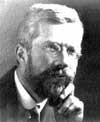
Sir Ronald Aylmer Fisher
Fisher did much to provide a sound scientific and mathematical basis for statistics. He invented the Analysis of Variance, stratified random samples and was a pioneer in the design of experiments. Much of his statistical work was derived from his study of biology, and he was also a pioneer in population genetics.
Despite the fact that he was to become the premiere statistician of his day, his career did not have an auspicious beginning. After graduation from Cambridge he was unable to find professional employment and worked briefly on a farm in Canada. Fortuitously this solidified his interest in biology, which was to be fundamental throughout much of his career.
Fisher's early papers on the theory of distributions were favorably recieved by Karl Pearson. However, since many of his papers dealt with biological data unfamiliar to his reviewers, their publication was sometimes delayed. To be sure, Fisher himself contributed to these delays, withdrawing papers in anger when reviewers simply asked for clarifications. By 1919, however, this had developed into a full-blown feud between Karl Pearson, the leading statistician of the day. Fisher felt that that Pearson no longer had original contributions to make -- probably true -- and that he was unfairly criticized -- partly true.
In any case, Fisher declined a position at the Galton Labs at University College in London since it would have met working in close proximity with Pearson. Instead he took a position at the Rothamsted Experimental Station, where he made some of his most original contributions to statistics and genetics.
In 1933 Pearson retired from the Galton chair and it was divided, with Fisher holding one chair and Pearson's son Egon the other. This was particularly stressful since Fisher continued personal attacks on the elder Pearson after his death and extended his feud to include Egon Pearson.
Fisher's political views, like those of Galton and Pearson, were less than popular although less overtly racist. He felt that natural selection should be permitted to run its course and that modern welfare provisions interefered with the course of nature.
Fisher's theoretical approach to statistics was based on three principles familair to students today:
FIsher was knighted in 1952 and recieved numerous honors, including membership in the Royal Society, the National Academy of Science (USA) and Deutsche Akademie der Naturforscher Leopoldina. When he retired from University College, he took a post at the University of Adelaide in Australia, where one can find a biography from the Royal Society.
Born: 17 Feb 1890 in London, England
Died: 29 July 1962 in Adelaide, Australia
The premiere site for biographies of mathematicians on the web is at The University of Saint Andrews in Scotland; this is the primary source of the information in these short biographies. Some biographies used additional web resources as noted in the biography.
The postage stamp images came from a wonderful site on mathematicians on stamps maintained by Jeff Miller, a mathematics teacher in Florida.
The Free Internet Encyclopedia Wikipedia is also an excellent source of information and was used as a reference for many bographies.
The opinions expressed in these biographies are those of the author and do not reflect official views of the University of Oklahoma.
